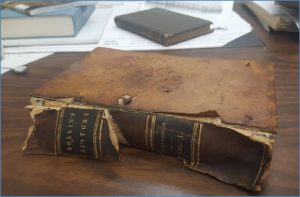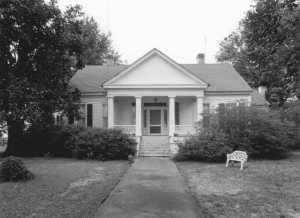Lost and Found on Elm Avenue
Published 8:52 am Saturday, March 21, 2020
|
Getting your Trinity Audio player ready...
|
Evan Kutzler
Evan.kutzler@gsw.edu
Artifacts—the physical remains of the past—are everywhere. Often an object’s significance to a human story is not at first apparent. Studying history is the process of making that connection.
It had already rained once on June 18, 2019, and I hoped to run a few miles before the next wave of thunderstorms rolled through Americus. I took a different route than usual, crossed Lee Street near Pat’s Place, and headed north on Elm Avenue toward Rees Park. Just north of Pat’s Place sat a series of boxes overflowing with junk. It was not the usual weekly trash but the sort of refuse when rented spaces are cleaned out. Everything goes all at once.
The pile contained the remnants of recent but still bygone eras. There were old CDs and magazines, miscellaneous clothing from the 1990s, a rusty clipboard that cut me when I picked it up, and—surprisingly—one damaged copy of Charles Rollin’s The Ancient History of the Egyptians, Carthaginians, Assyrians, Babylonians, Medes and Persians, Macedonians and Grecians. The damaged leather-bound book, published in 1857, piqued my interest, and it came to my office (alongside the clipboard!) with me a few hours later. Perhaps it would make for a useful exercise in object-based research.
A Human Clue
Object-based research reveals the human history behind things. Imagine this book could answer speak and answer questions. One might ask, “Where did you come from? Whose shelf were you on? How did you end up alongside the road?” It needed to give me something more than the dank smell of wet leather. After all, if its significance just lay in printed words, text that has been digitized, then perhaps the damaged book should back onto the pile. Despite some damaging evidence, I am not a hoarder. This was only a reprieve for the condemned book, not a full pardon.
There are different ways to assess a book’s significance beyond reading it. The digital age makes answering some questions easier. Its author, Charles Rollin (1661-1741) was a French historian whose religious views put him at odds with the Catholic Church. Forbidden to teach, Rollin published several books, including a twelve-volume Ancient History. Yet here was an English reprint, published by J. B. Lippincott & Co. in Philadelphia more than a century later, and the publishing history told me little about this specific book’s past. Marginalia, handwritten text in the book, offered the best two clues into the book’s physical journey. One inscription indicated that this volume had been in “Booth E44” of an antique mall. E. J. Prothro, an early owner, inscribed his or her name in pencil.
Rollin’s Ancient History.
The First Owner
Finding the name of the book’s one-time owner opened up new research questions. Who was E. J. Prothro? When did he or she put her name in the book? Research serendipity intervened. Census records revealed a seventeen-year-old Evan James Prothro living in Stewart County, Georgia, in 1860. The house still stands just outside of Richland and is listed on the National Register of Historic Places. Evan was born in Georgia; his father, Nathaniel, and mother, Emeline, as well as his older sister Mariane, came from South Carolina. The young man attended school in 1860, so he may have already owned Ancient History at that time.
Nathaniel Prothro Plantation, Richland, Georgia. Photograph by James R. Lockhart, Georgia DNR.
Evan came from a wealthy family and that wealth flowed from the profits of cotton and slavery. In 1860, the family owned $8,000 in real estate and $37,755 in personal property—mostly enslaved people. When the U.S. Census came to the family’s house in 1850, the government worker noted that the family owned eight men, women, and children. Ten years later, three years after the publication of Ancient History, the white family held nineteen people in slavery.
The educated young man from a wealthy slave-owning family may have been on his way to college when the American Civil War broke out. Evan enlisted on May 18, 1861 as a private in Company C, nicknamed the “Chattahoochee Beauregards,” of the 10th Georgia Infantry. His regiment served in the Army of Northern Virginia, and fought in many of the major eastern battles as well as Chickamauga, Chattanooga, and Knoxville in the so-called western theater. His family status was not unusual. According to historian Joseph T. Glatthaar, about 25% of the soldiers in Lee’s army had a household wealth under $400; another 25% had household wealth above $10,000. Likewise, 44% of the soldiers in the Army of Northern Virginia came from households with enslaved people.
The War Letters
The search might have ended there, but research serendipity intervened again. The Georgia Department of Archives and History contained five letters written by Prothro to his family during the war. In the earliest letter, written to his father from Richmond in June 1861, Prothro described his transition from civilian to soldiering life. He wrote, “We are well fed, having bacon, beef, flour, meal, rice, coffee, and sugar and a market in Richmond, were we can buy any kind of vegetables [at] very low [prices].”
Prothro also observed rapid mobilization for war. “There are about 3,000 men in Richmond making utinsils [sic] of war,” he told his father, “and they are making them as fast as possible.” At the Tredegar Iron Works, Prothro watched the casting of exploding artillery shells and cannons weighing as much as 17,000 pounds. He chaffed at inaction and longed to test his steadiness in battle.
One year later, as Gen. Robert E. Lee rose to fame defending Richmond from the U.S. army, Prothro had more mixed attitudes toward fighting. While he was happy to have escaped recent battles, he described the Union army as cowardly. “If they would only meet us in the open field,” he wrote, “I would not ask any better fun than to whip out the yankee army, but they know it and the only way we can whip them is by wearing them out by time and I think we can whip them as well by prolonging the war as by fighting battles.” Prothro wanted a pitched battle, like a hoplite battle from Rollin’s Ancient History, and was slow to see the benefits of earthworks and indirect tactics.
Prothro showed both resilience and signs of fatigue in 1863 and 1864. After predicting that the U.S. army was running out of steam, he confessed how much we wanted to come home. Prothro believed furloughs should be distributed based on merit; however, the captain let “nearly every man who wanted one” enter their name in a lottery. After losing the lottery, Prothro criticized the winners as cowards. Some men, he said, “ran out of the Sharpsburg fight” and others “stragled [sic] and kept out that way.” His honor was at stake. Prothro did not want those at home to think the men returning from Virginia were better soldiers than him.
After the War
The end of the Civil War and the end of slavery did not ruin wealthy white families. Prothro became a regional cotton businessman, frequently traveling between Richland and Americus, as well as a banker and a promoter of railroad expansion in the 1880s. He died in San Francisco on August 11, 1909. The Americus Times-Recorder reported that the life-long bachelor “went upon a pleasure trip to the Seattle Exposition, and died while in San Francisco upon the return trip home.” It took one week for his body to reach Richland.
While sick in San Francisco, Prothro wrote his will. He left his estate to his brothers, sisters, and their children. If Prothro kept Ancient History until 1909, his death was the first step toward the book ending up on Elm Avenue in the rain 110 years later.
Artifacts help make the past feel closer, more real and tangible. In this case, marginalia pointed to the history of a young man’s education, a slaveowner’s wartime experiences, and financial rebound in cotton and railroads after the Civil War. It is worth noting, though, that wealth, gender, and the regional obsession with Confederate history made this research possible. Had the “E.” in J. Prothro referred to an “Esther” instead of an “Evan,” the inquiry would have been lucky to end with the U.S. census.
Prothro’s copy of Ancient History may still end up in a trash one day. Consider this an advertisement: free to a permanent home.






